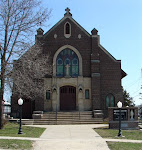Jeffrey Tucker thought he had heard it all in the world of music. Then he attended a chanted Mass.
Unlike the secular music he was used to, the simple chant he heard raised his mind and heart to God. This life-changing experience facilitated his conversion to the Catholic faith in 1985.
Unfortunately, he was disappointed with much of the music he heard in church. Tucker decided to do something about it. In 2002 he became a member of the Church Music Association of America, and has been the managing editor of the group’s journal Sacred Musicsince 2005.
Tucker is also editorial vice president of the Ludwig von Mises Institute, which bills itself as “the research and education center of classical liberalism, libertarian political theory and the Austrian School of economics.”
But as far as the Catholic heritage of music is concerned, the object of Tucker’s most recent enthusiasm has been the assemblage and distribution of a book of chants to correspond with the implementation of the new English translation of the Roman Missal later this year.
You’re a convert to Catholicism. How did your conversion occur?
Every time I tell the story, it is different. I recently realized why: Conversions are too big for full cognition. Too many influences hit us from too many directions to make sense of it all, and there is the element of the divine that surpasses consciousness. So I’m at the point of realizing that I do not and cannot know how or why it occurred.
However, I do know this: Music played a role. I had been a lifetime musician, playing in symphonies and jazz combos and everything in between. But there was something about hearing the Mass chanted with just a few small notes — by an older priest with a tired voice — that transformed me completely. I was about 22 years old and I had never heard anything so beautiful. The total absence of ego and the total absorption in a purpose beyond time enthralled me. I think that these notes unlocked my mind to understand and opened my heart to a kind of love I had never known. Looking back at it, those small notes had a more powerful effect than the shelves of books and the endless hours of studying the faith.
How did your newly-found interest in sacred music proceed from there?
That chant in Mass that I heard from the late Father Urban Schnaus at the Basilica of the National Shrine of the Immaculate Conception exposed me to something completely new, something words and argument alone could not express. The context mattered too: This wasn’t a music history class. It changed everything. My whole aesthetic outlook changed. Instead of looking for truth and beauty in the avant-garde, I found it in music that was unbound from the temporal world.
From the chant, I moved on to listen to Renaissance polyphony, in which I heard a level of sophistication that I did not hear in much modern music, which seemed strangely superficial and simple by comparison. It’s like comparing a medieval cathedral to a trailer home. Gradually, chant and polyphony took over my brain and hardly any other music mattered anymore.
Of course my fascination with it began as purely artistic, but when I realized that there was a reason for its structure and sound, my appreciation grew. I realized that it is all a form of prayer, and the musical structure amounts to an attempt by mortals to touch a realm of immortality. It was all an attempt to somehow capture and characterize what the ancients called the “music of the spheres,” which is something like a heavenly sound that might be worthy to be presented by angels at the throne of God. The composers and the tradition heard something true and beautiful and the liturgy absorbed it as its own.
It goes without saying that secular music doesn’t attempt this at all. It is designed to flatter the performers, indulge the composers, entertain the audience, or whatever. There is a place for this approach in the culture at large, but sacred music has a different purpose. To me, to begin to understand liturgical music is to realize this central point that appears in Christian writings from the earliest age: There is a difference between sacred and profane. Many people deny this today, which just amazes me. I consider it so axiomatic that it is not worth debating, only explaining.
Why do people deny it? It has something to do with an embedded agnosticism born of deconstructionist thinking. There is no intrinsic meaning in anything, this view says, so how can we really make such distinctions between what is sacred and what is not?
But you are more than a student or listener; you’re also a practitioner and a director.
I became interested in sacred music as a practitioner because the tragedy of its loss is so undeniably obvious to any practicing Catholic. Given our heritage, given what Catholicism has done artistically through the ages (we invented music notation, for example), given what Vatican II called the “treasury of sacred music,” it is shocking how absent it is from our parishes. But that’s only the beginning of the problem. The real core is the loss of the ideal, the near absence of an understanding that musicians have any serious responsibilities to the ritual. So far as I can tell, this is an unprecedented situation, and it cries out for change.
Many people have noted what a dramatic contrast the reality is from the hope of the Second Vatican Council, which called for the Gregorian tradition to assume first place at Mass.




